Last fall I reviewed the updated aluminum Devinci Troy, and when the carbon model launched this year I was offered the chance to ride it too. The carbon Troy has almost identical geometry to the aluminum version, except there’s an extra rear end size for the carbon frames, and they offer a lower standover height. The complete Troy Carbon also drops more than two pounds from the aluminum version!
Devinci Troy Carbon – Key Features:

For complete details on the new Troy Carbon lineup, check out my launch article from earlier this summer. Here’s a quick rundown of the bike’s major features and specs.
2025 brings the 5th generation of the Troy Carbon frame, offering more travel, more aggressive geometry, updated suspension kinematics, and a sleeker overall design. Built for all-mountain riding, the Troy’s Split Pivot suspension linkage now offers 150 mm of rear travel. 160mm forks are stocked on all models.
The Troy Carbons come stock on MX wheelsets, but a flip-chip in the lower shock mount allows the option of running 29” wheels. With MX wheels, you must use the flip chip’s Hi position, but with 29” wheels, you can run the bike in either Hi or Lo settings.

Devinci has given the Troy Carbon its SHED in-frame storage compartment. The storage door hosts a side entry water bottle cage, and all frame sizes will fit a 500ml bottle or larger (with a reservoir shock).
Key fitments include a Boost 148mm rear axle, SRAM UDH dropouts, and a threaded BB shell with 3-bolt ISCG05 mounts. The frame also features fully guided internal cable routing.
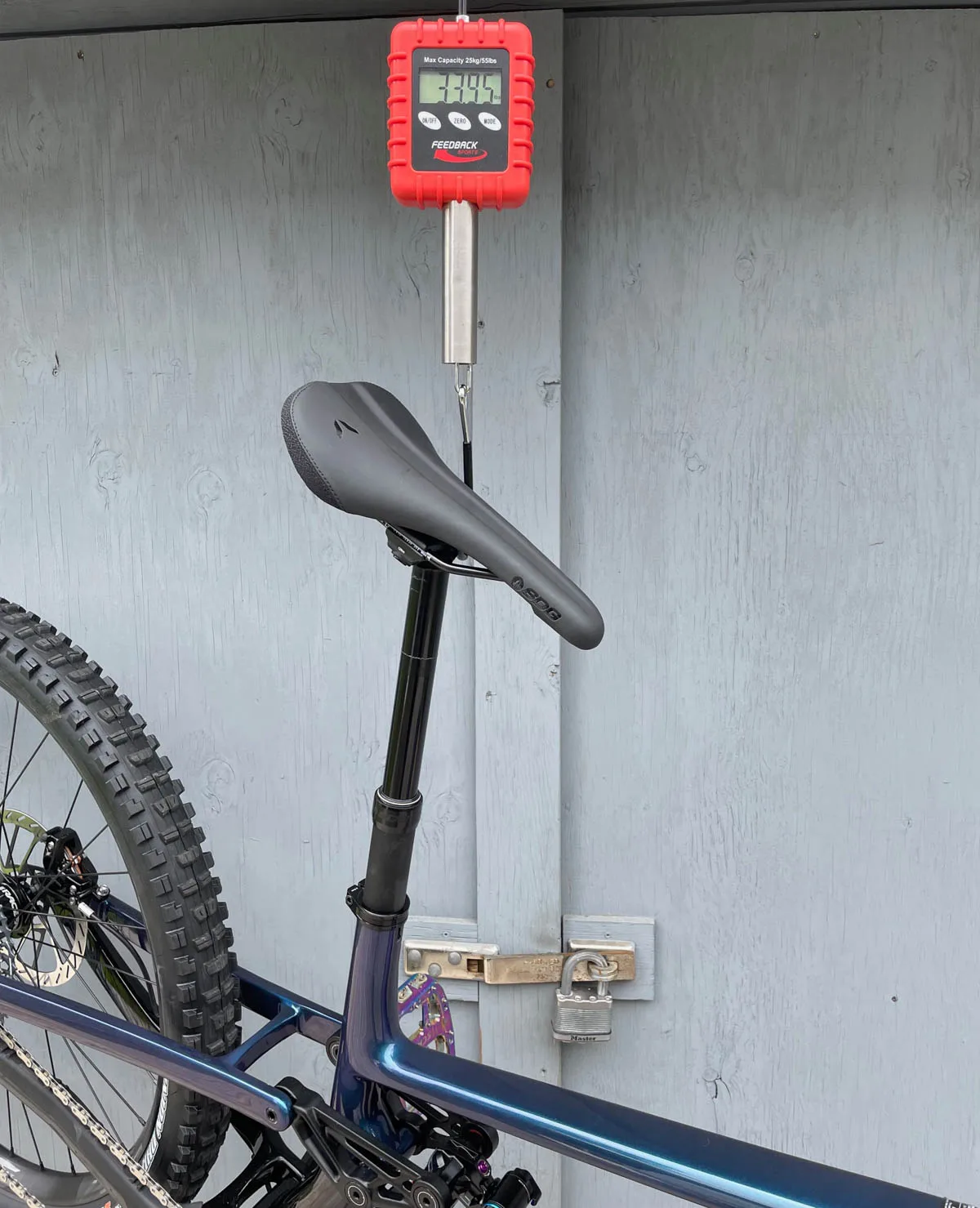
The complete size medium Troy Carbon (with pedals) hit my scale at 33.95lbs with pedals. That’s roughly 2.3lbs lighter than the aluminum Troy.
Ride Impressions – Fit/Geometry:

The 5th generation Troy Carbon frame geometry provides a slacker steering angle, steeper seat mast angles, a longer wheelbase, and lower standover height vs. the gen 4 frame. The new carbon frames get three different rear end lengths across the four available frame sizes.
I’m 5’10”, and the medium Troy felt comfortable to me right away. Most of the Troy’s angles and measurements are very close to, or exactly what I like.
I don’t have a spare 29” rear wheel that fits the Troy frame, so I rode the bike in its stock MX configuration. If you’re curious about running this bike as a niner, check out the chart above to see the geometry for its Hi and Lo settings.
MX geometry (as ridden):
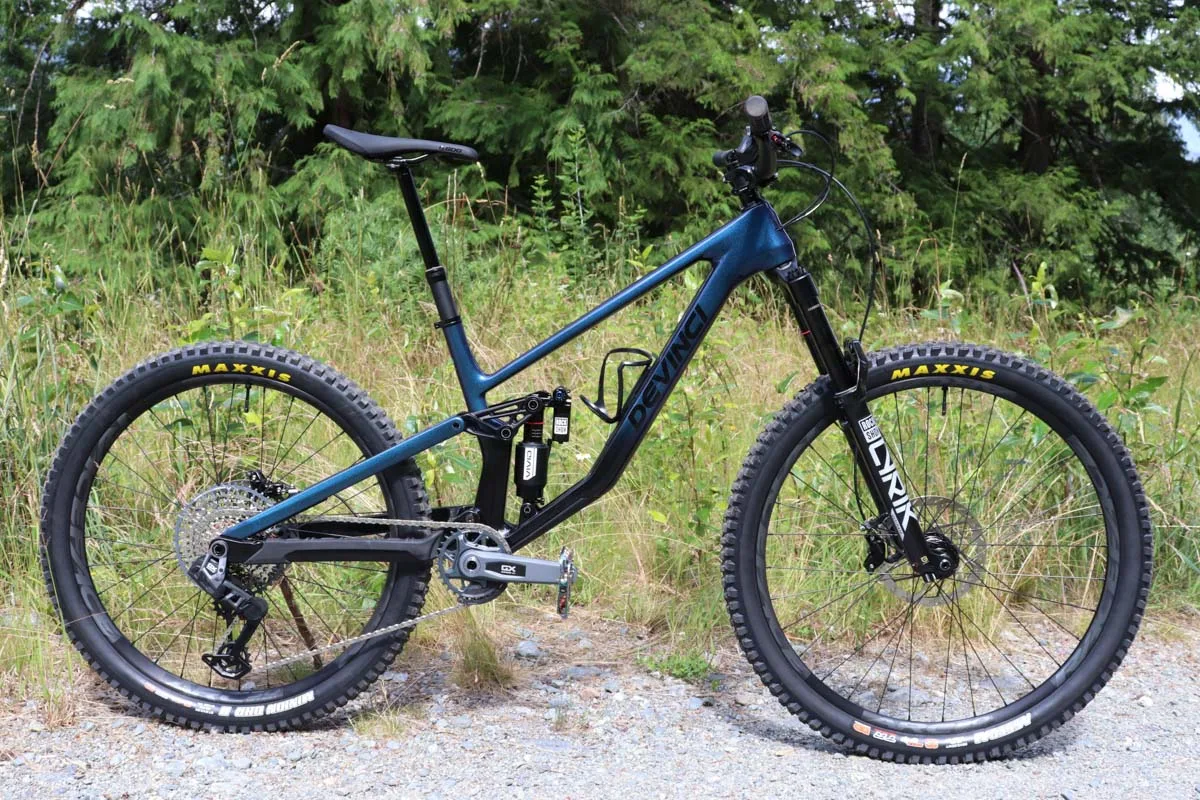
The Troy Carbon’s 460mm reach is roomy but not massive. It’s long enough to feel like an up-to-date trail bike should, but short enough that I’m not leaned forward too aggressively or straightening my arms too much. The stock 40mm rise handlebar helps keep the position comfortable too. Short 432mm chainstays keep things feeling snappy out back. It’s easy to pick up the Troy’s front wheel, and the bike is quick and agile through berms and corners.
A 64° head tube angle is exactly what I’d pick for a versatile trail bike of today. The 77.8° seat mast (medium frame) is steep enough to ensure powerful pedalling efficiency.
The Troy Carbon’s BB height sits at 343mm, which is low but not super low. I got away with hardly any pedal strikes on rocks or roots. This frame’s standover height is nice and low at 708mm. Near the seat, the top tube drops noticeably lower than most other bikes I’ve tested.
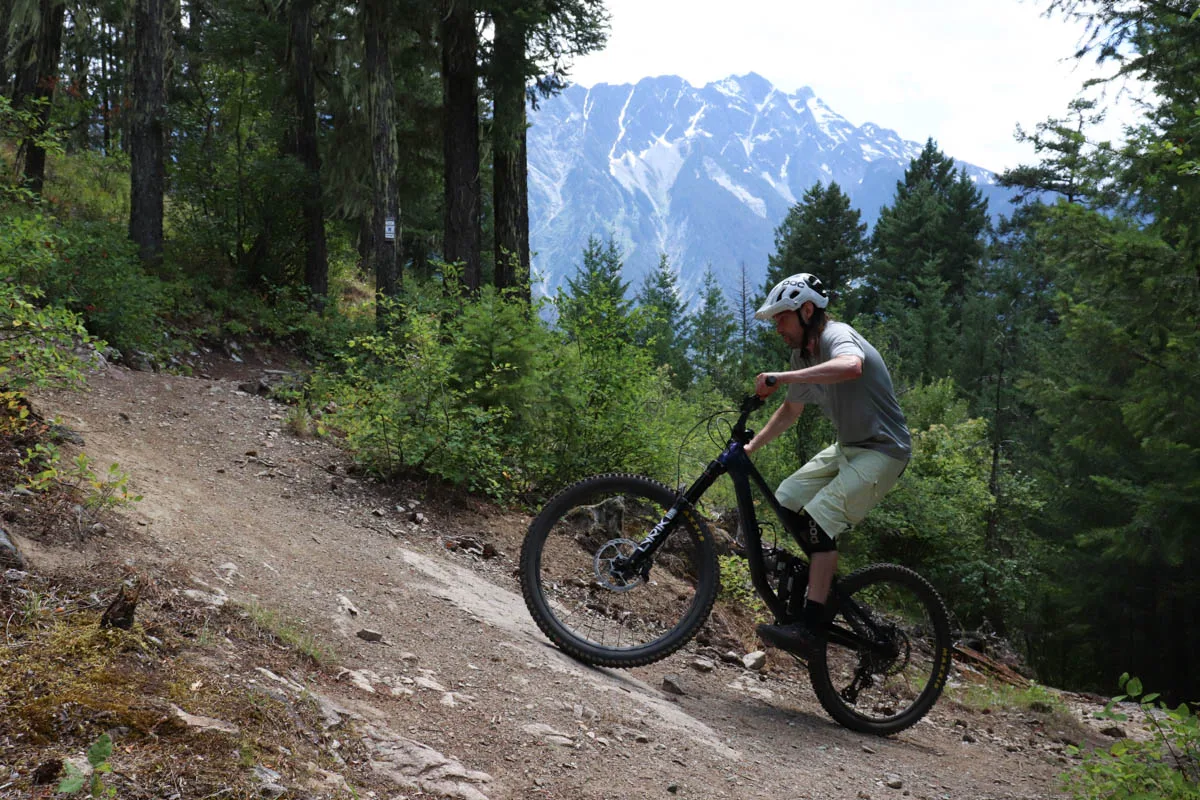
I think Devinci nailed the sizing of the Troy Carbon – It’s just big enough to feel stable and roomy like a modern trail bike, but it still offers agile handling that encourages playful riding. The reasonable weight, MX wheelset, and lively suspension feel contribute to this as well.
Even with the Troy’s stubby rear end, the frame geometry feels very well balanced. I have found longer rear ends can enhance that ‘dead between the wheels’ feeling, but the Troy still offers enough of that feel without going long out back.
My body weight is nicely centered over the bike, and I never needed to shift around much to enjoy solid traction from both wheels. Aside from the steepest uphill pitches, I hardly ever felt the need to stand up and pedal.
Suspension – Setup and Climbing:

One note for readers – The Troy’s rear linkage requires more air pressure than matching your body weight in psi. Devinci recommends setting the sag at 30%. I wound up with the RockShox Vivid Ultimate shock at 165psi for my 140 lbs weight. I should note that I am not the roughest rider, so other riders might prefer a bit more air pressure. My local Devinci rep, for instance, is not much heavier than me, but he runs a lot more psi in his Troy.
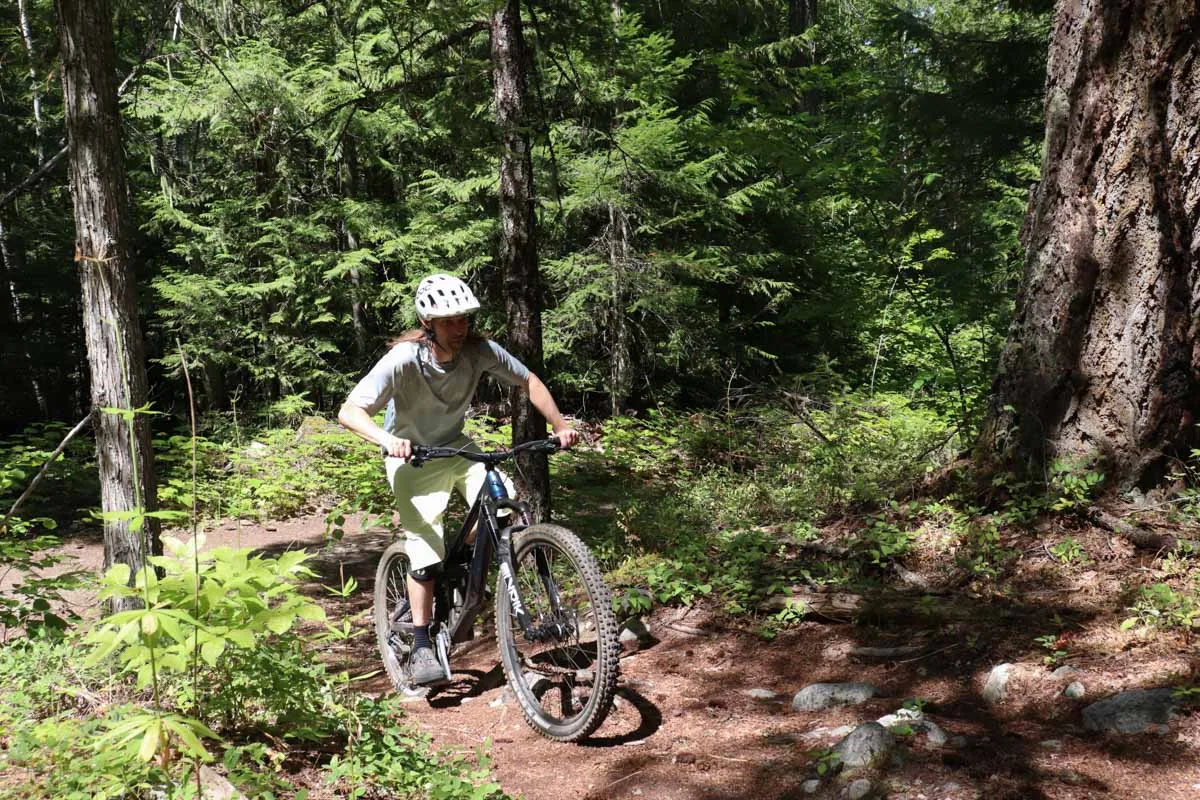
With the shock firmed up, pedalling efficiency is maximized and the Troy’s linkage resists diving too far while you’re cranking away. After many o-ring checks, I found the rear end will allow about 50% travel on typical singletrack trails. In firm, you will feel what’s happening on the trail below, and that rear end lifts as it climbs up and over roots and rocks. I never found traction at all troublesome in this mode; there’s still enough travel in action to keep the rear wheel stuck to bumpy climbs.
Climbing with the shock wide open, you will sag to about 65-70% travel. However, pedalling efforts still feel very well supported, and the bike pulls ahead eagerly when you’re cranking hard on it. If my butt got to make the choice, I would climb this bike with the shock wide open all the time! This mode offers a much more comfortable ride vs. firm mode, nearly eliminating smaller trail inputs and lessening the heaving feel when the back wheel tackles larger bumps. The Troy is definitely a reasonable bike to climb without relying on the rear shock’s firm mode.
Descending:
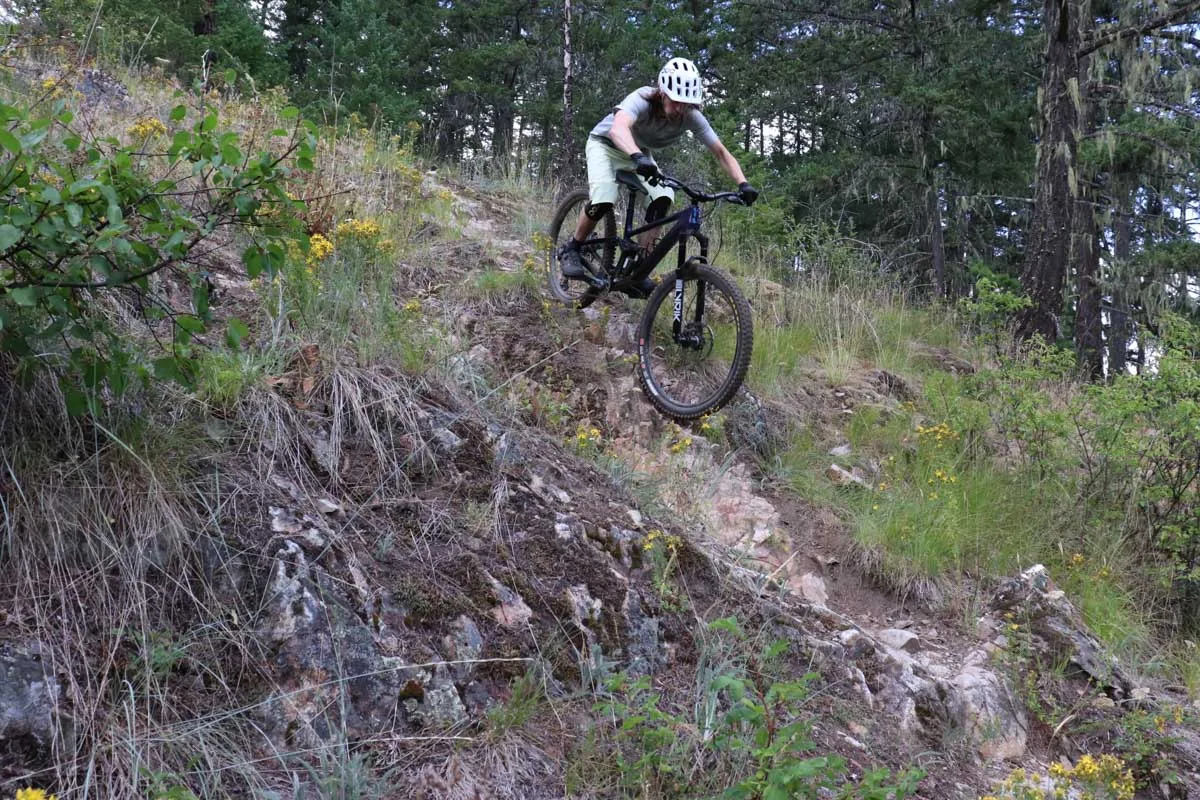
While it doesn’t feel like a bigger bike than it is, the Troy’s 150mm linkage and the pleasantly plush RockShox Vivid Ultimate rear shock do a great job of taking the edge off medium and larger impacts. On less technical sections of trail, any small bumps are smoothed out very well by the initially soft and sensitive rear end.
The bike felt really well planted through repeated medium sized bumps, as it butters through them with ease. The shock and linkage soften hard impacts impressively well, and the Troy’s rear wheel maintains great traction in rough rock gardens or root beds. I set up the shock following factory recommendations (aside from psi, set to sag) and felt no need to change anything to achieve an excellent ride from the Troy.
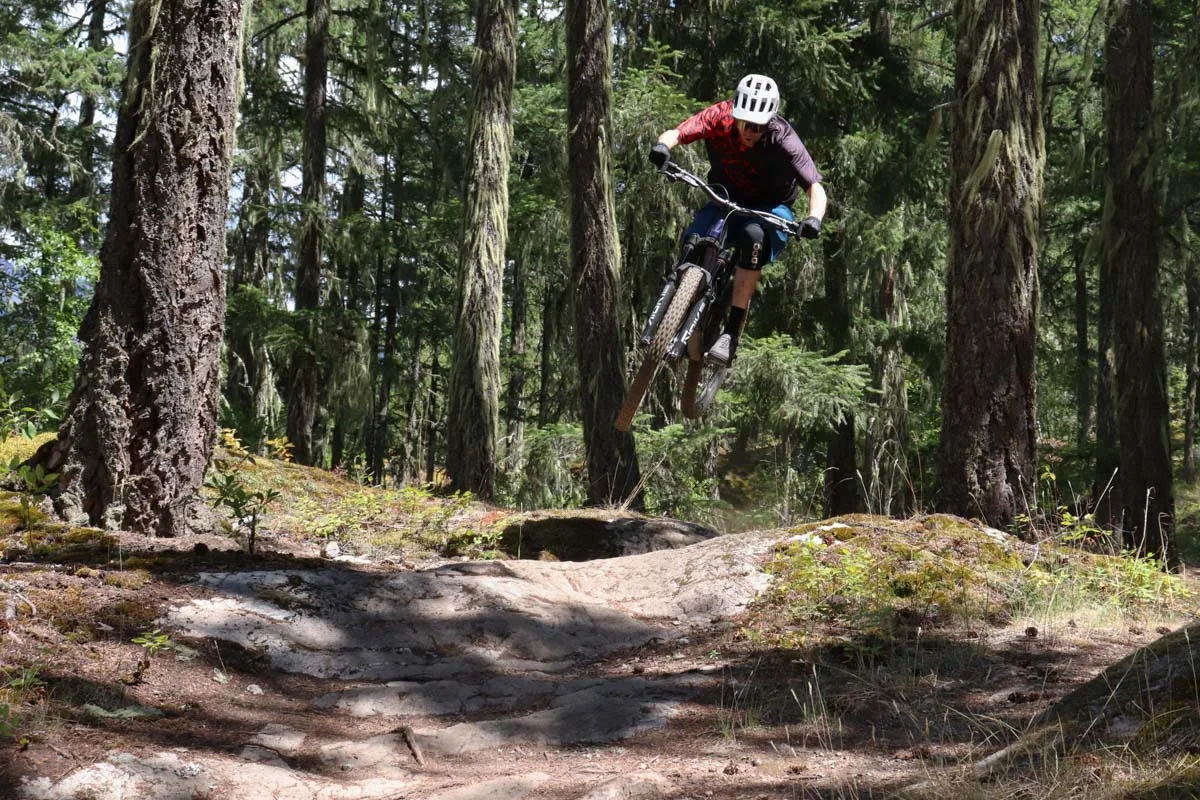
Not surprisingly, the Troy Carbon’s suspension reminded me a lot of the Devinci E-Spartan Lite I just finished reviewing. It’s sensitive to small bumps, very good at eating up big hits, and offers a delightfully supportive mid-stroke. It sounds a bit contradictory, as the Troy is eager to dive into its travel when faced with a big impact, yet it also maintains a supportive ride quality. The lively linkage makes the bike feel light on its feet, and the Troy Carbon already sits at a good weight. This is a very fun bike for those who like to hit jumps, pop off roots, and seek out gaps in the trail.
Hydraulic Bottom-Out Control:

After getting comfortable with the Troy Carbon and riding it harder, I noticed I was bottoming out the rear end a bit more than I usually do. I considered adding a few psi to the shock, but realized this was a perfect opportunity to test the Vivid Ultimate’s Hydraulic Bottom-Out control.
Initially, I had the Hydraulic Bottom-Out fully open, as I am a lightweight rider. Then one day, I fully cranked up the Bottom-Out control and rallied down a fast, rough trail I ride quite often. On this section, I noticed the difference it was making. I still used 99-100% of the Troy’s travel, but I never felt any harsh clunks from the rear end. It seems to ramp up the end stroke just enough to prevent those abrupt bottom-outs, but it doesn’t stiffen up the shock enough to limit travel use. It’s definitely an adjustment that’s worth experimenting with!
Other Ride Notes:
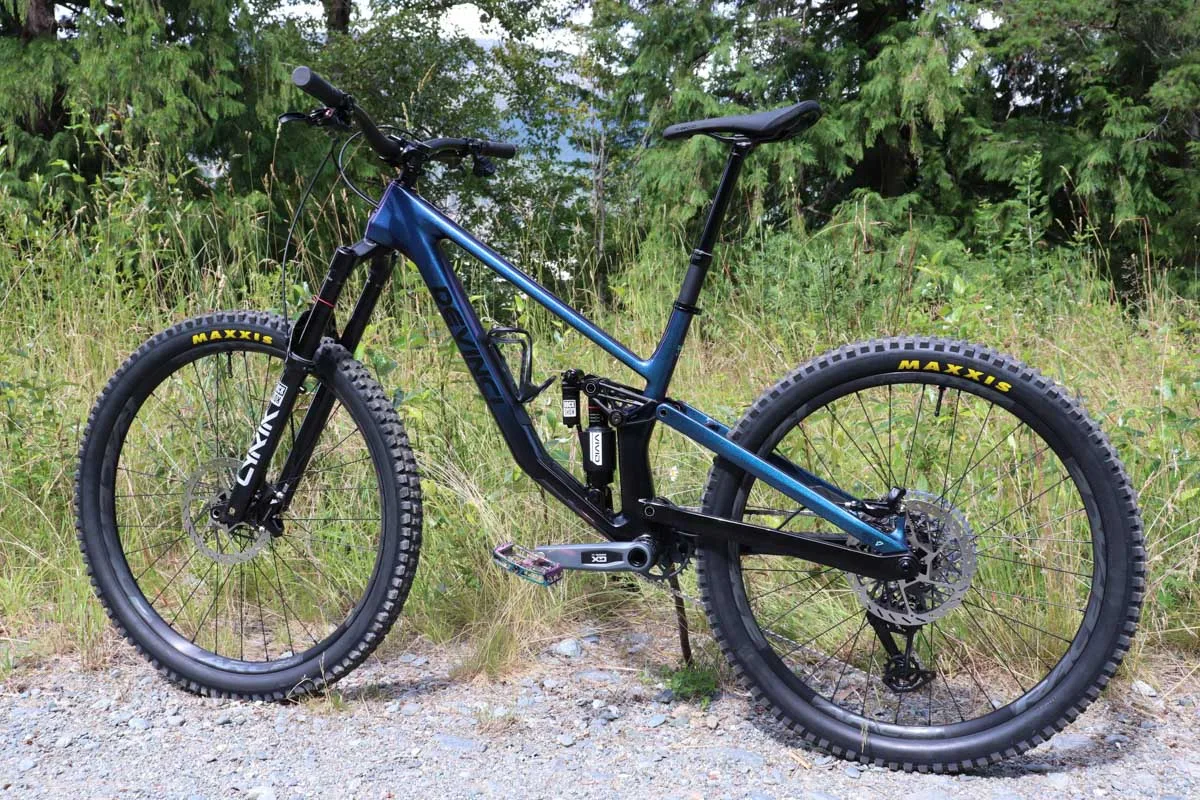
As for frame stiffness, the Troy Carbon is bang-on for a trail bike. It’s noticeably stiffer than the Kona Hei Hei CR XC bike I recently tested (as you’d expect), but it’s not just super stiff. While pinballing at speed through rocky sections, I did find a bit of forgiveness in the frame. The Troy Carbon is rigid enough to feel controlled and solidly hold a line through rough sections, but there is a small degree of compliance.
I’m pretty happy with the Troy Carbon’s weight. It’s the lightest 150/160mm bike I’ve ridden in a few years. The only trail bike I’ve ridden recently that beats it is the 145/150mm travel Specialized Stumpjumper carbon, at just 31.72 lbs.

Devinci’s SHED in-frame storage is a handy feature. I had no trouble carrying a compact multi-tool, a large CO2 canister, an inflator head, a valve core tool, a tire plugger, spare plugs, and a spare AXS shifter battery. A few other small items could fit in there too.
The included tool bag is padded enough to prevent any rattling while you ride. The latch on the storage door is a bit small, but it’s still easy to operate with gloves on, and the door clicks into place firmly.
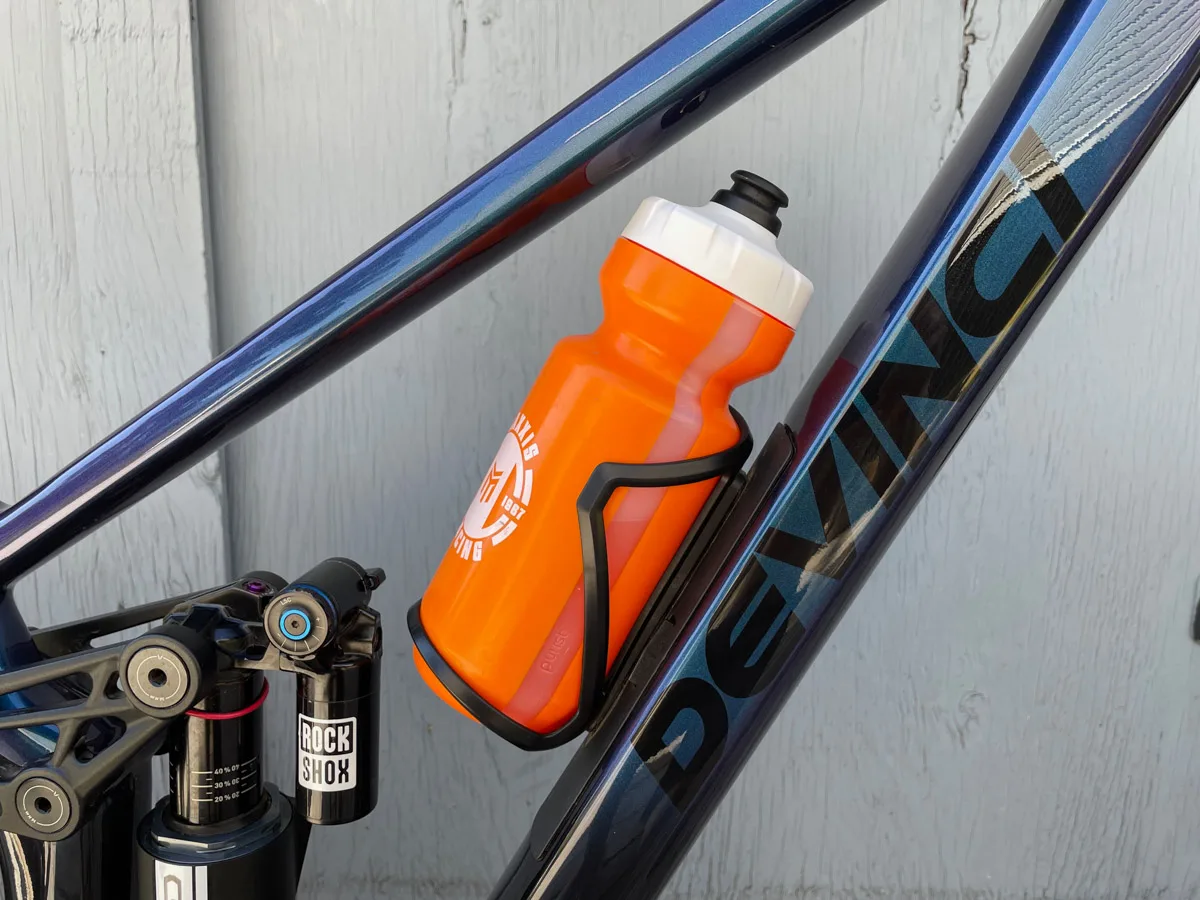
It seems the carbon Troy offers a bit less room for water bottles vs. the aluminum frame, but Devinci says all frame sizes can fit a 500ml bottle or larger. I ran a larger bottle Devinci gave me in the aluminum Troy, but found it didn’t truly fit in the carbon frame (it would rub the top tube coming in and out). The carbon frame has sleeker tubing, but the top tube is slung lower than the aluminum model. A standard small bottle was totally fine in the medium carbon frame.
Components:
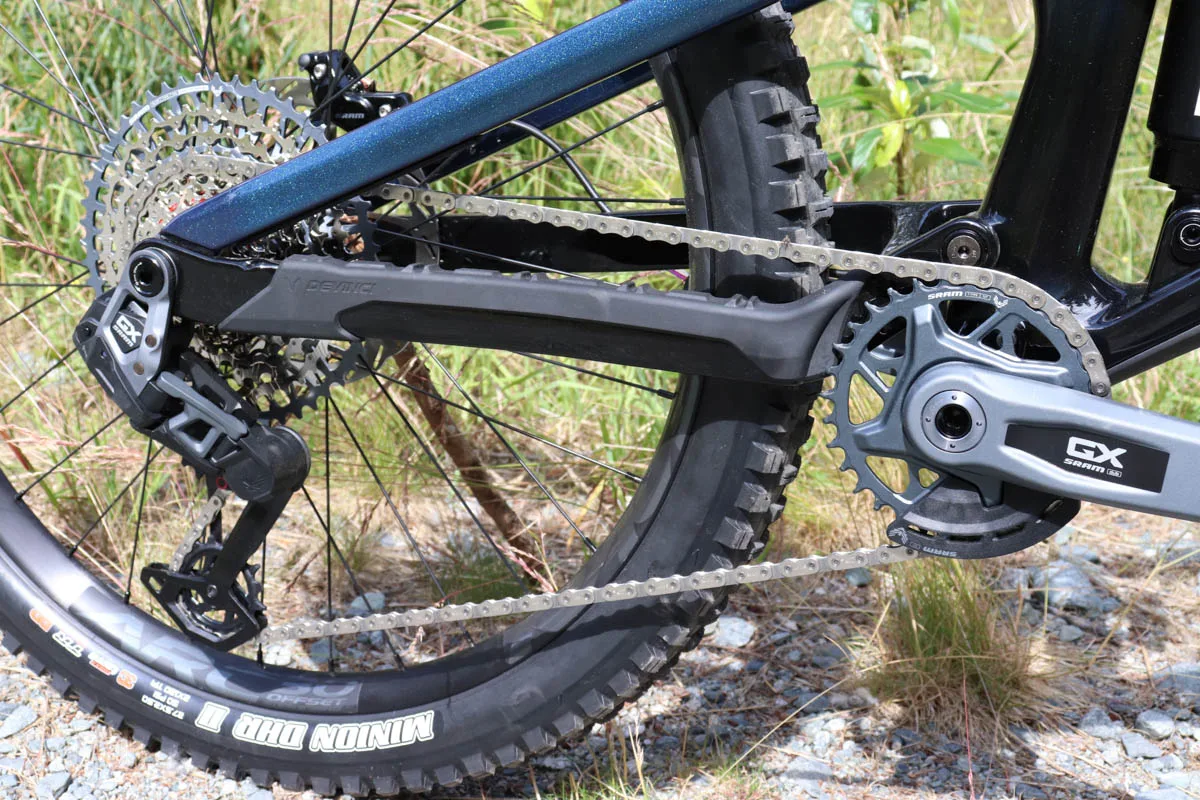
The Troy Carbon GX AXS 12s comes with a RockShox Lyrik Ultimate Charger 3.1 RC2 Fork. I set it up to factory recommendations, with no tokens, and enjoyed great performance from it. It’s a suitable fork for this bike, and offers HSC, LSC, and rebound adjustments.
This higher-end Troy Carbon build gets a SRAM GX Eagle AXS drivetrain, which performed without fault throughout all my test rides. The partial bash guard on the chainring is a nice addition to the build.

The SRAM Code Silver brakes are the best brakes I’ve ridden since testing SRAM’s Mavens (my new favorite)! On a pair of 200mm rotors, these Codes seemed particularly powerful, even compared to previous Codes I’ve ridden. As you’d expect, their modulation is excellent, and they performed with perfect consistency.
Race Face’s ARC30 rims held up super well, with the front wheel rolling like its brand new and the rear showing about a 1mm side wobble and no hops. Devinci gave the Troys Maxxis Assegai and Minion DHR II tires, both 2.5” widths with Double Down casings. These are proven tires that I’ve always liked, offering great performance in any conditions.

SDG’s Tellis dropper post proved to be perfectly reliable. I’m stoked to see a 170mm travel post on Devinci’s medium frame. The SDG Bel Air 3.0 saddle didn’t wow me, but it was comfortable enough.
A carbon handlebar is always a nice touch, and the Troy Carbon GX AXS 12s gets a Race Face ERA 35. They come stock at 800mm wide, which I like, and Devinci went with a 40mm rise model that allows for a pretty comfortable body position.
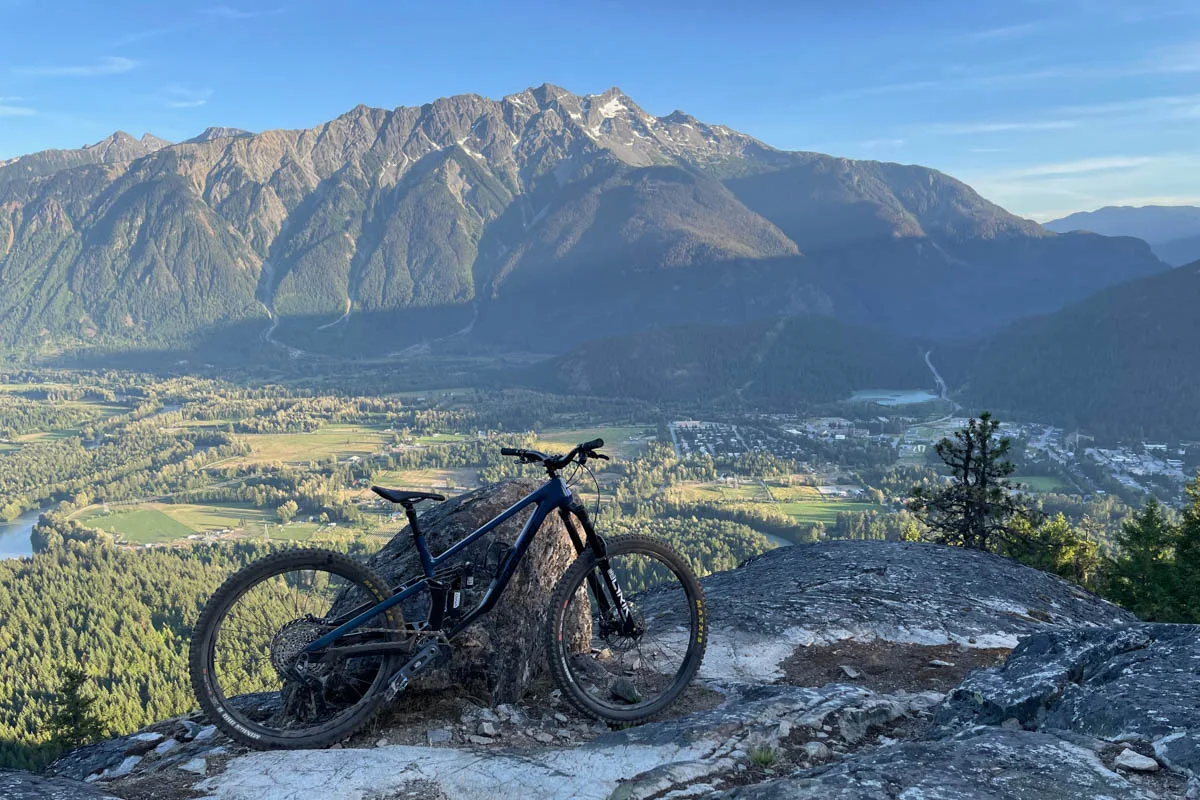
The Troy Carbon GX AXS 12s sells for $6499. This model is only available in a Gloss/Incognito colorway.

